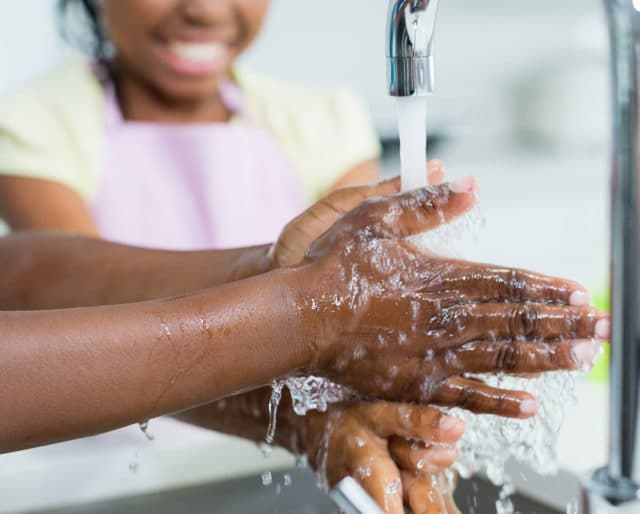Dr Matshidiso Moeti, Regional Director for Africa, World Health Organisation (WHO) has emphasised the life-saving importance of handwashing to prevent a range of diseases, including COVID-19.
Moeti said this in a message issued from the WHO Regional Office in Brazzaville, Congo, on Tuesday, to commemorate the World Hygiene Day.
Celebrated every year on May 5, Hand Hygiene Day mobilises people around the world to increase adherence to hand hygiene in health care facilities, thus protecting health care workers and patients from infections.
READ ALSO: Assad warns COVID-19 cases may Increase as Syria Eases Lockdown
“This year, as we battle the COVID-19 pandemic, the life-saving importance of clean hands has never been more prominent.
“We can protect ourselves and our families by frequently washing our hands with soap and water or an alcohol-based hand rub.
“Hand hygiene, along with physical distancing, respiratory etiquette and disinfecting surfaces are the basic preventive measures for a range of diseases, including COVID-19.
“In this context, several African countries are providing water to communities free-of-charge as part of the national response, so that more people can wash their hands,” Moeti said.
According to her, in celebration of the Year of the Nurse and the Midwife, this theme of World Hand Hygiene Day 2020 is, “nurses and midwives, clean care is in your hands.”
She said the theme was chosen because infection prevention and control, including hand hygiene, was important in all settings.
“It is especially important in health-care facilities as part of ensuring quality patient care.
“At WHO, we are working with countries, the World Food Programme and other partners to ensure health workers have essential supplies, such as personal protective equipment, including gloves.
“In recent weeks, we delivered replenishments to more than 50 African countries.
“We are also working with sub-regional nursing associations and other partners and have trained more than 3,000 health workers via interactive virtual seminars, including demonstrating good hand hygiene,” Moeti said.
The regional director, however, said WHO had been working with partners on hand hygiene, saying: “We urgently need to scale-up access to water across the continent.
“In Sub-Saharan Africa, more than one in four health-care facilities have no water service.
“An increasing number of facilities are producing alcohol-based hand rubs locally, but this is not a substitute for safe, reliable water supply.
“Limited access extends beyond health facilities to communities. Basic handwashing facilities with soap and water are available in less than 50 per cent of households in Sub-Saharan Africa.
“In response to COVID-19, more and more handwashing points are being set-up, and we need to look at longer-term solutions to sustainably increase access.’’
In addition, Moeti said over the past 20 years, progress on access to water in Sub-Saharan Africa was mixed.
She said the number of people using unimproved sources remained the same and that the number using surface water decreased by one third.
“The number of people travelling 30 minutes or more roundtrip to collect water, more than doubled, and this burden falls mainly on women and girls.
“So, on this World Hand Hygiene Day, I call on governments, private sector partners, innovators, scientists and communities, to invest in access to water for health facilities and households.
“COVID-19 is shining a light on inequities in access to basic services and we have an opportunity to improve access to water for vulnerable communities.
“Clean hands save lives, and safe water is essential in handwashing. Together we can make access to safe water a reality for all Africans,’’ the regional director said.
The 2020 campaign theme “SAVE LIVES: Clean your hands,” is aligned with the Year of the Nurse and the Midwife.
The aim is to recognise nurses and midwives as front-line heroes who deserve acknowledgement and appreciation and highlight their critical roles in infection prevention.
The main goal of the Global Hand Hygiene Day campaign is to recognise that handwashing is one of the most effective actions you can take to reduce the spread of pathogens and prevent infections, including the COVID-19 virus.
Health workers and community members alike can play a role in preventing infections by practising regular and frequent handwashing.

